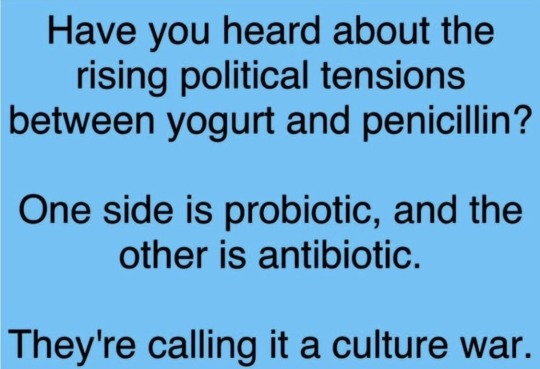Text
And then there’s being nice. And there’s Aziraphale finding comfort in being nice, and Crowley knowing that “nice” can the worst—both unforgiving and hollow.
I keep on imagining the two of them listening to Stephen Sondheim’s Into the Woods—and to Crowley identifying with the witch when she sings, “You’re so nice / You’re not good, you’re not bad / You’re just nice / I’m not good, I’m not kind / I’m just right.”
Kindness, Goodness, and Unconditional Love: A Character Analysis from Season 2 of Good Omens
An analysis of Aziraphale and Crowley in relation to kindness versus the capital G Goodness of Heaven and an exploration of how imperfect love actually means everything will be okay in the end.
This essay is also published on AO3 in case it gets eaten by Tumblr
Without further ado…
Crowley is kind. His natural inclination is to be kind. There’s no working at it, there’s no trying to be kind. In fact, there’s quite a lot of trying NOT to be kind; he is a demon after all. But when he thinks no one’s looking, or when he lets his guard down, he is kind.
He saves Job’s children and his goats. “I go along with Hell as far as I can,” he says. What he means is, “I go along with Hell as long as I know I can’t get away with being my true self.”
He saves Elspeth, going so far as to tell her to be good. “Properly good,” even. He blames the laudanum, “not responsible for my actions.” No Crowley, you aren’t, are you? And you acted in your true nature without the wits to pretend otherwise.
Aziraphale is also kind, but it’s a different type of kindness. It’s a kindness that he’s conscious of and that he works at. Unlike Crowley, whose natural tendency is to be kind, Aziraphale’s nature tends towards judgment and righteousness and he tends towards frustration when he or those around him fall short of his idea of perfection. That’s his “just enough of a bastard.”
Aziraphale has to work very hard at being kind. That isn’t to say that he isn’t kind, because he is. Working to be kind indicates a desire to be kind and that indicates a kind person at heart.
Aziraphale’s main problem, I believe, is the confusion in his mind between kindness and Goodness, specifically the capital G Goodness of Heaven. Kindness and goodness are more or less interchangeable; kindness and Goodness are not.
When Crowley saves the goats and the children, Aziraphale insists that he must be “a little bit on our side.” Crowley counters this line of logic when he reminds Aziraphale that God is the one who gave permission for him to kill the kids in the first place. Heaven is Good but not kind. Crowley is kind but not Good. Aziraphale doesn’t see that yet, but he will; give him time.
When Elspeth steals bodies, Aziraphale has another crisis. Is it Good or is it Evil? There are solid arguments for both. Heaven’s doctrine doesn’t allow for gray areas; actions are either Good or they are Evil. He struggles with what to do because he wants to be Good, but doesn’t know which action he should take to align himself with that doctrine. He still doesn’t quite know where Crowley fits either. “You, unfortunately, are Evil,” Aziraphale says. Crowley must be Evil, Aziraphale reasons, because he is a demon and sides with Hell. But there’s an “unfortunately” there. Something doesn’t quite fit. He doesn’t know what it is yet, but he will; give him time.
By the time we get to 1941, we see Aziraphale finally admitting to shades of gray. “Shades of very light gray,” he insists, but shades of gray nonetheless. He’s beginning to learn, modeled by Crowley no doubt, that maybe Heaven doesn’t have the whole story. Maybe it’s possible to be good without being Good. Maybe that’s where Crowley lies. Maybe, just maybe, he fits in that space too, if only just a wee bit.
Fast forward to present day (season 2). Aziraphale has committed to “our own side.” There are bad angels (several) and good demons (at least one). There are a hundred, a thousand, a million shades of gray. There is nuance found in this imperfect, human world that he and Crowley belong to more than they ever belonged to Heaven or to Hell.
Aziraphale is kind. He has to try to be, he has to remind himself, but he is kind. He slips up, most notably when he brainwashes the entire street into going along with a Jane Austen style ball to woo his beloved demon, but that’s alright, there’s room for error.
Crowley is kind. There’s no more pretending for him. There doesn’t have to be. He can finally be himself. There’s still a shadow of trauma over him, a sense of not belonging, but he is kind underneath it. He frees Maggie and Nina from their shop without a second thought. He makes Jim hot chocolate even though he mostly hates him. And when it comes down to the wire, he doesn’t hesitate to protect the humans from Shax’s attack. He isn’t perfect either. He growls at Jim on the regular, he snarks at Aziraphale on several occasions, but that’s alright, there’s room for error. And someday, when he’s ready for it, there will be room for forgiveness. Not from Heaven, not from God, not even from Aziraphale, but from himself.
They are both kind, in the complicated, nuanced way of the world they’ve come to call their own. Neither of them are perfect, but that’s alright, they don’t have to be.
Heaven’s idea of being Good means to be perfect. Humanity’s idea of being good is being kind, as well as you can be. Sometimes you fall short, but there’s room for error. There is room for imperfection. There is room, most importantly, for forgiveness.
There’s a concept called unconditional love that is very applicable here. It means exactly what it sounds like: love with no conditions.
Heaven’s love is very conditional. It is very strict. It requires perfection. There is no room for error. There is no room for forgiveness.
Love doesn’t exist in Hell. They saw love, conditional, unforgiving love, as faulty. They too missed the space for nuance and so rejected love outright.
Unconditional love, love in spite of imperfection, can only exist on Earth, and Aziraphale and Crowley have found it in each other. It isn’t perfect, it can’t be, but that’s alright, they will keep trying and find room for it and for each other regardless. Yes, even when they miscommunicate. Yes, even when they hurt each other. Of course, it wouldn’t hurt nearly as badly if there wasn’t love at the center of it all, would it?
And that brings us to that scene, you know the one. Neither of them are perfect. Both of them make mistakes.
Aziraphale’s is the most obvious, he is the one who demanded so much from Crowley, after all. What Aziraphale saw was an opportunity to correct Heaven’s version of Goodness to match with this new one that he’s learned. He can FINALLY fix the source of so much mental turmoil and he can do it with Crowley at his side. Better yet, he can fix it so that Crowley aligns with Good too. This doesn’t mean that he wants to change Crowley; Crowley is exactly as Aziraphale wants him. What it means is that Good itself will change to fit what Aziraphale already knows is good, and that’s Crowley. In Aziraphale’s mind, if he can change this alignment of Goodness, all of his and Crowley’s problems will be solved. But there’s a huge, insurmountable problem with Aziraphale’s plan: Crowley won’t follow.
Crowley knows there’s no fixing things; Heaven is set in its broken ways and the two of them won’t be able to do anything about it. He’s right, but that doesn’t make Aziraphale wrong for wanting to try. Remember that Aziraphale struggles to be good at times; it doesn’t always come naturally to him. For Aziraphale, finding this ‘good’ thing difficult to do is not unusual.
But back to Crowley. What Crowley heard from Aziraphale’s plan was not what Aziraphale intended. Aziraphale wanted to change Heaven to suit Crowley, but Heaven, in Crowley’s mind, is unchangeable. Again, he’s right, but regardless of the truth of the matter, we have two beings whose fundamentally different understandings of the system they are bound to having a fundamental misunderstanding as a result. Crowley believes, with a great deal of pain, that Aziraphale wants to change him. Worse than that, Crowley knows that it won’t work.
There’s no fixing Crowley; he’s not Evil, but he certainly doesn’t want to be Good. The damage was done when he Fell and Rising won’t put him back together again. Aziraphale, in Crowley’s opinion, wants something impossible from him. He doesn’t have a chance. It doesn’t help that Aziraphale’s sales pitch is punctuated with phrasing like “you’re the bad guys.” Crowley isn’t one of them anymore, he had just made that point very clear, and it hurt that Aziraphale still saw him that way.
Crowley’s mistake isn’t in refusing to help. Crowley’s only mistake, really, is not getting his point across clearly. I don’t blame him for this; effective communication takes practice for both the speaker and the listener and practice is something that both of them sorely lack. And that’s not even touching on the way Aziraphale’s sudden proposal threw a wrench in Crowley’s carefully plotted love confession, turning it abruptly into a rather desperate plea to save ‘their side’.
I encourage you to go back and watch that part of the scene from Aziraphale’s perspective; pretend you didn’t see any of what Crowley saw in Heaven. Most of what Crowley says doesn’t make sense. Aziraphale doesn’t know that Jim was in trouble for the exact thing that he is about to set out to do. Aziraphale doesn’t even know that Armageddon 2.0 is Heaven’s goal. The only thing he knows is that he has a chance to set Heaven right and to protect Crowley while he’s doing it. He’s wrong, but Crowley isn’t effectively telling him that and Aziraphale isn’t listening well enough to read between the lines.
And that circles us back to the reason why it hurts so much. They do love each other. Unconditionally. It isn’t something either of them can help.
They’re each hurting and seeing that they hurt the other only compounds that pain. They are both hurt and confused and running out of time to fix it.
“Why won’t he come with me?” Aziraphale wonders. “Why is he so stubborn that he won’t even try? I thought I meant enough to him for him to forget his hatred, but I’m never enough, am I?.”
“I’ve always known he thought less of me because I’m a demon,” Crowley thinks, “but is it really a deal breaker? I thought I meant enough to him, but I’m never enough, am I?”
They’re running out of time. The Metatron is right outside.
“You’re at liberty to go,” Aziraphale says. It’s not what he says this time, but he means the same thing. Crowley will leave, but he’ll come back. He always comes back.
“No nightingales,” Crowley says. That’s not the game they’re playing anymore. This is the last time. He won’t be coming back.
Aziraphale’s expression changes in that instant. It’s finally clicked; he’d missed Crowley’s whole side of the conversation. He hadn’t been listening.
But now he’s out of time to fix it. Crowley is kissing him, a starkly human expression of exactly what he means, and Aziraphale can’t think. And then Crowley is gone.
Crowley leaves, but only goes as far as the street. He’s always been the one to come back before, but he’s not doing it this time. Too many lines were crossed. Too many emotions bared. But he’ll wait awhile. Maybe Aziraphale will change his mind.
Then Aziraphale leaves. It’s a final leaving, in both of their opinions. Crowley knows he won’t budge. Aziraphale knows it too, though he still doesn’t understand why.
It won’t be the last they see of each other, but neither of them are sure of that in this moment. It’s alright that mistakes were made, but they’re both too hurt to see that yet. There’s room for forgiveness, room to mend what they broke. They’ll see it someday, when they’re both ready. They’ll get another chance to talk and to listen and they’ll do both with new knowledge learned from past mistakes. Love will prevail, because the unconditional kind always does; it’s right there in the definition. And when it hurts along the way, well, that’s only proof of concept, isn’t it?
#this meta put into words SO MUCH of what I feel is THE POINT of their story#and the point is#DOLPHINS#you need to be kind to dolphins and whales and humans and angels and demons and and all the helpless creatures#good omens#good omens meta#crowley#aziraphale#good omens 2#ineffable husbands
33 notes
·
View notes
Text
Okay, buckle up buckaroos, because today I met an honest-to-goodness cryptid.
I was out running errands and I made a stop at Intimate Books (…for a friend), and on my way out I realized that the bookshop next door was open.
This bookshop has existed for more than a hundred years, and in all my life it has NEVER BEEN OPEN. I mean, I assume it has to be open sometimes, but never at any normal, reasonable hour. Everyone says it’s a front for the mob or something.
So what do you do when the weird mafia bookshop is open? You go the fuck inside.
The first thing I noticed was the smell. You know that smell when you accidentally leave your towel on the bathroom floor all day and you come back to that mildew funk? The shop smelled like that times a thousand. I expected to see stuff growing on the walls, but the books were pristine. We’re talking first editions, rare editions, weird Bibles and books inscribed to really famous dead people. Librarians would weep for the chance to accession this place. In the first two minutes I found a signed copy of The Crucible and what I think was a first edition of Blake’s Book of Thel.
Then a clerk showed up out of nowhere—honestly nowhere. He looked EXACTLY like a bookseller should look, kind of fluffy and bewildered and really, really gay.
“Are you lost?” was the first thing he said to me.
“Nope. Just browsing, thanks.”
“Browsing, I see. Erm. How do you feel about snakes?” he asked. And without waiting for me to answer, he just walked away and vanished around a shelf.
I figured it was a metaphor, or a code phrase for the mafia. Until I turned a corner like ten minutes later and found a little reading nook. It was really pretty, although I feel like that particular window should have been on an interior wall? Anyway, curled up in an armchair in a patch of sunlight was the biggest fuck-off black snake I have ever seen.
Like, I don’t mind snakes in general. But in their normal context, right? Outside. On the ground. Not six feet long and sitting on a threadbare velvet armchair like it owns the place.
I was about to turn around and leave, but I saw a gorgeous first-edition copy of Leaves of Grass on a shelf, a little too close to the snake for comfort. But I had never needed anything so badly in my life.
So I went back to the counter to buy it, but the clerk was nowhere to be found.
While I was waiting, I noticed a collection of pictures hanging on the wall behind the counter, dating back to the very dawn of photography. A couple were of this rock-star looking guy from the 70s that I should probably have recognized, but there were authors and landscapes and stuff, too. There was even an old tintype portrait of Oscar freaking Wilde, sitting in this very shop with a guy that I would ACTUALLY SWEAR was the clerk from before. Like, I know my family all has the same nose, but this guy had the same everything.
After approximately one year of waiting, the clerk came back out to the desk. By now I’ve realized that he’s too bad at his job to be anything but the owner of the shop.
“I saw your snake,” I told him.
“Did you? Was he behaving himself?”
“He was sleeping.”
“Yes, he enjoys that.”
“Does he just stay out in the open like that? What if he gets out?”
He shrugged and smiled. “He always comes home again, the dear boy.”
Right, a homing snake. That’s totally normal.
Then he cleared his throat and asked, in a weirdly reluctant voice, if I was going to buy the Whitman.
“Yes, please,” I told him. “I saw it on a shelf by the snake, and it was just too tempting.”
He sighed. “Oh, yes, I expect it was.”
When I started to hand him my card, he went all fluttery and said that they didn’t take cards.
All right, fine. I had some cash on me, but I told him that he’d sell a lot more books if he got a Square or something.
He got this scandalized look on his face and went, “Why would I want to do that?”
Oookay. I handed over the cash and he popped open the ancient till and started making change.
In shillings. Shillings! I swear to god I saw Queen Anne’s face on one of them. The silver value of the coins was probably as much as I paid for the book.
But I had to have proof that this happened—at that point, all I had was a book in a plain brown wrapper, not appreciably different from what I bought next door. So I asked him for a receipt.
He looked delighted and wrote one up for me.
By hand.
With a fountain pen.
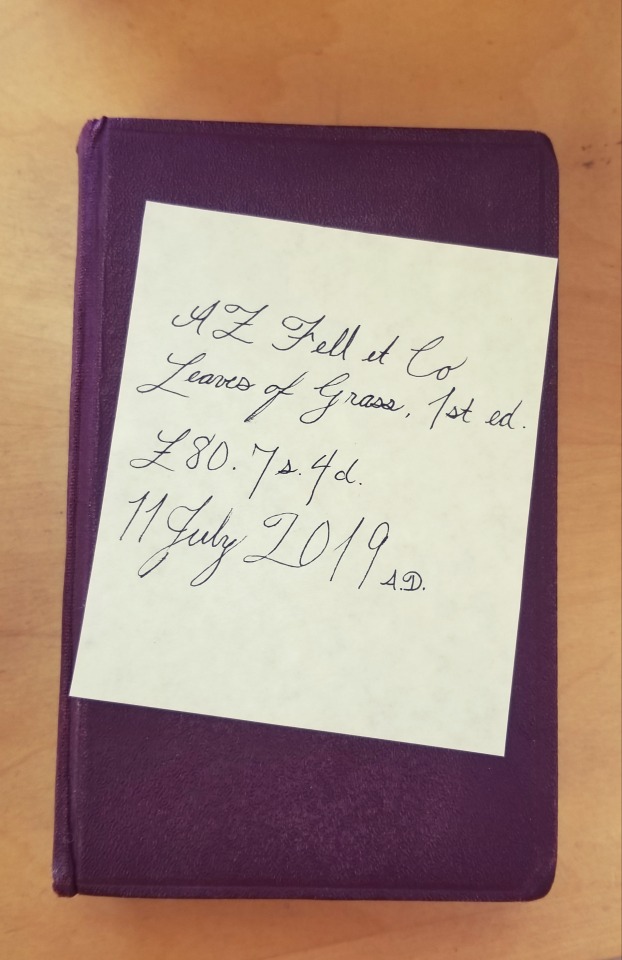
And that’s the story of how I met a bookseller cryptid and his pet snake.
55K notes
·
View notes
Text
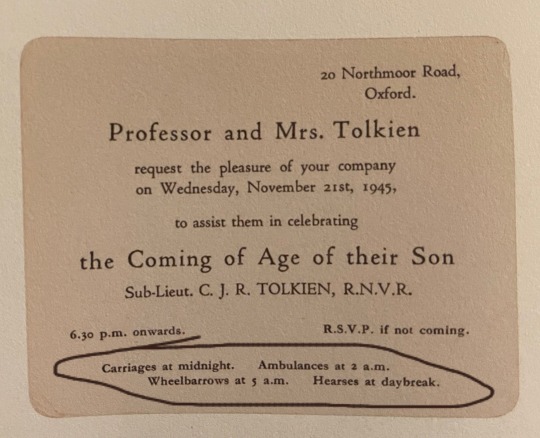
"our son made it through the war to come of age, let's fucken party! rsvp only if you're a little bitch who's NOT coming. all y'all not dead of alcohol poisoning by morning (lmao losers) get dunkt on"
edit: fascinating! the tags are full of two types of people. 1) people who think this is a joke and 2) catholics who fully admit to a bit of cheeky cultural alcoholism just nodding and saying "uh huh"
63K notes
·
View notes
Text
From the book:
“But after we win, life will be better!” croaked the angel.
“But it won’t be as interesting.”
Also, “Bloody ancient bird” makes me laugh every time.
From the tv version:
“What’s that he said that got everyone so upset?”
“Be kind to each other.”
“Oh, yeah. That’ll do.”
(It’s something that Sam Vimes could say.)
And from the radio version… “Also, I have caller ID.” (I’m quoting from memory. But if you’ve heard it, you know what I mean.)
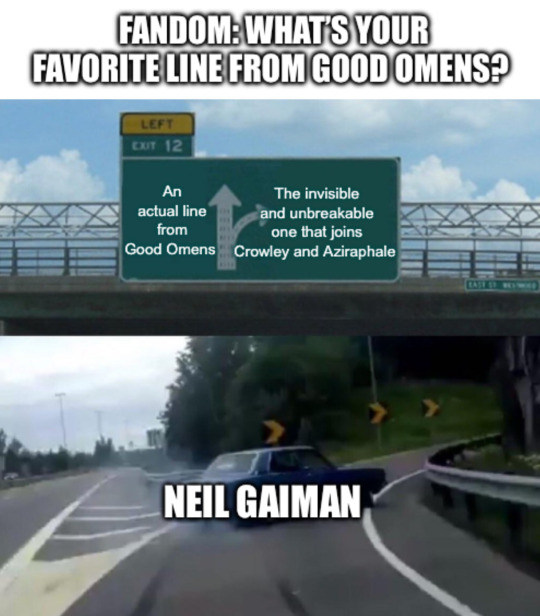
#good omens#good omens quotes#neil gaiman and terry pratchett#neil gaiman#terry pratchett#gnu terry pratchett
5K notes
·
View notes
Text
Fact: The earliest reliably dated use of the phrase “fucked up” appears in the court records of a US Navy court-martial case from 1863; the way the phrase is used suggests that its meaning was already well known at the time, but this is the first known printed record of it that we can confidently put a date to.
Additional fact: Bram Stoker’s Dracula is set in 1897.
Conclusion: It would not anachronistic for your Dracula fanfic to have a character describe the Count as a fucked up old man.
59K notes
·
View notes
Text

It Began In A Garden features:
@ednav with "Moving Miracles"
Here's your sneak peek!
GET YOUR GARDEN GOODS HERE
3 notes
·
View notes
Text
Oh. That’s… A LOT. And right, of course.
it has taken me until today to interpret the story/moral of sodom and gomorrah within aziraphale accepting jim into the bookshop and giving him sanctuary. and in his decision to return to heaven. are you serious
510 notes
·
View notes
Text
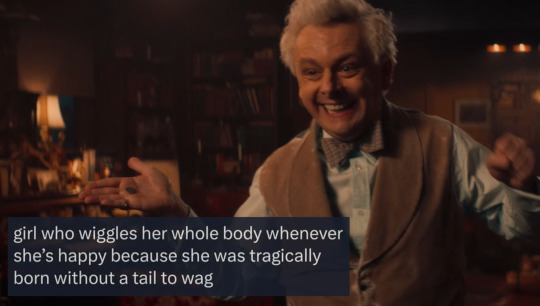

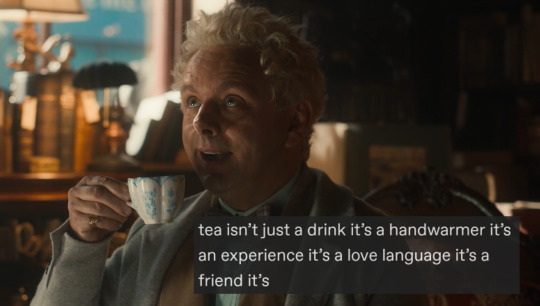
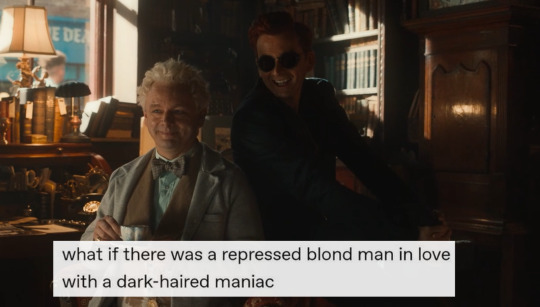
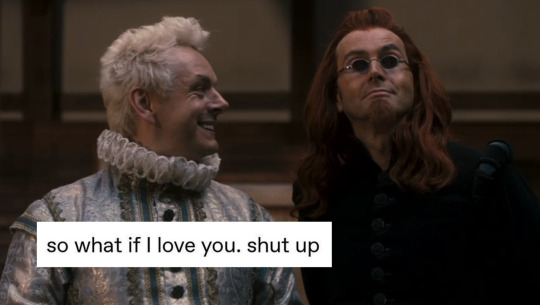
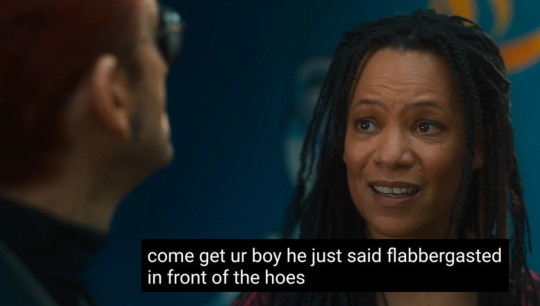
Good Omens + text post memes
[give me more memes]
2K notes
·
View notes
Text
More minisode connections:
Right here.
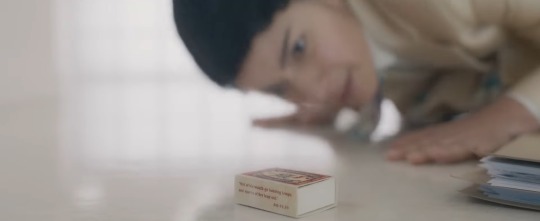
All of the minisodes are on this matchbox.
The matchbox is from the Resurrectionist pub.
It has a quote from the Book of Job on it.
The quote is 41:19, or, if you flip that, 1941.
What is up with these intense minisode hints??
238 notes
·
View notes
Text
Please return us to a world where Notp and squick are used for a ship you don’t like instead of just making up a load of bullshit about how immoral it is or w/e lol
156K notes
·
View notes
Text
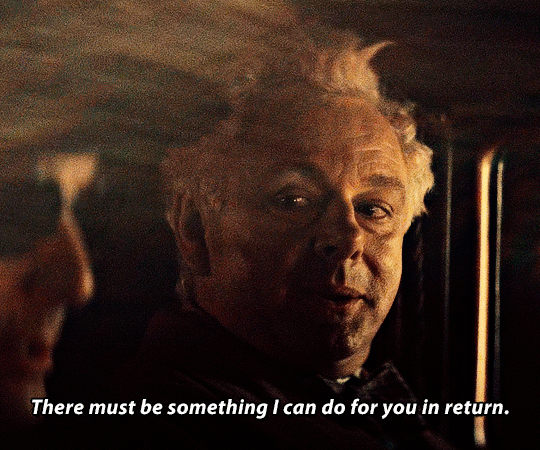

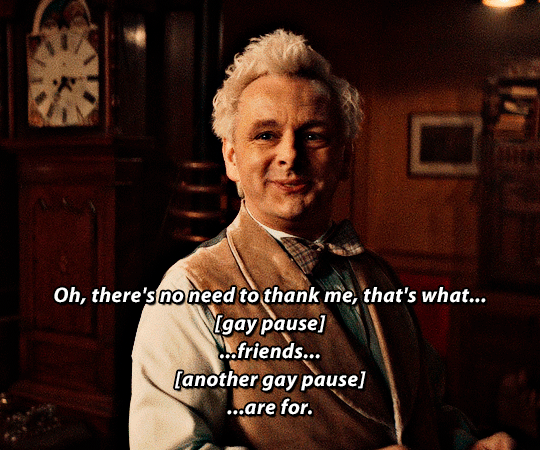
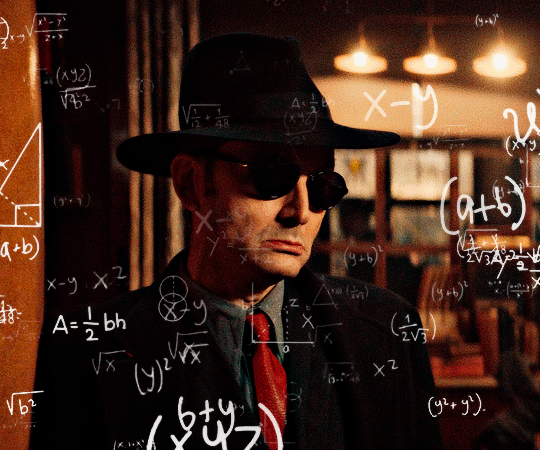
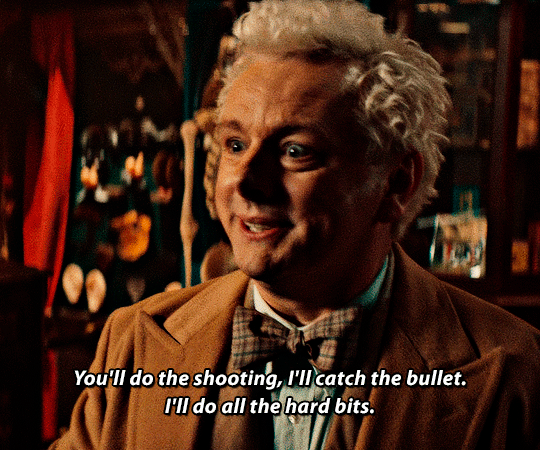
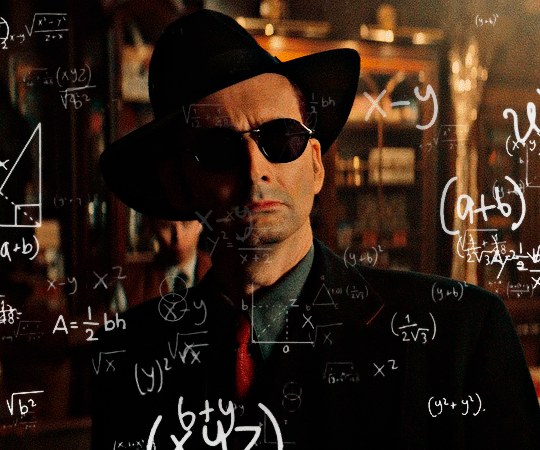
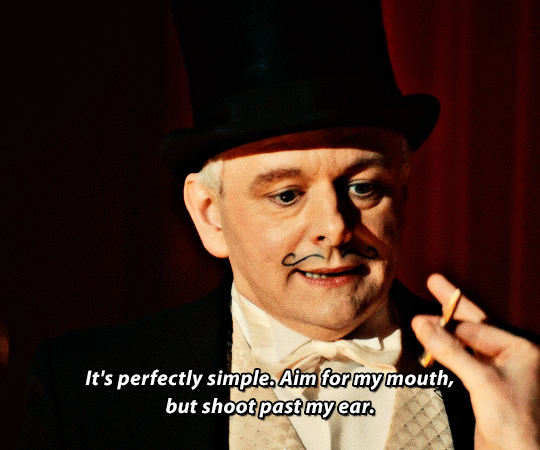


#reblogging it again#sometimes I’m a bit down and just thinking about this post makes me laugh out loud#good omens#good omens text post#ineffable husbands
24K notes
·
View notes
Text
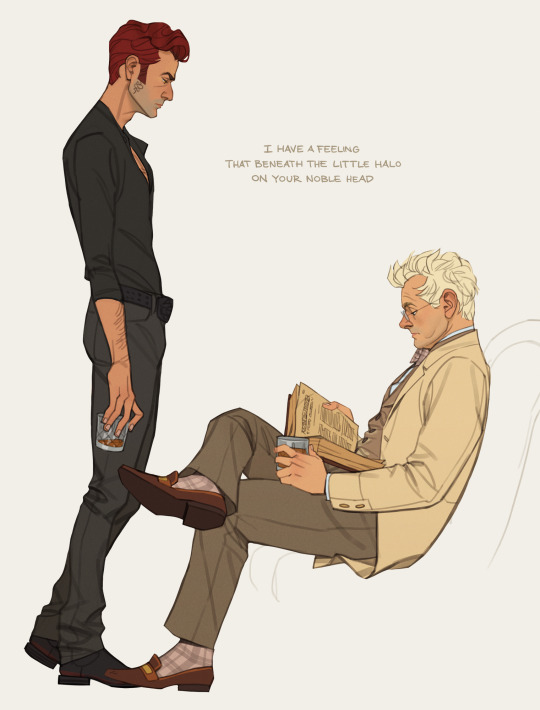
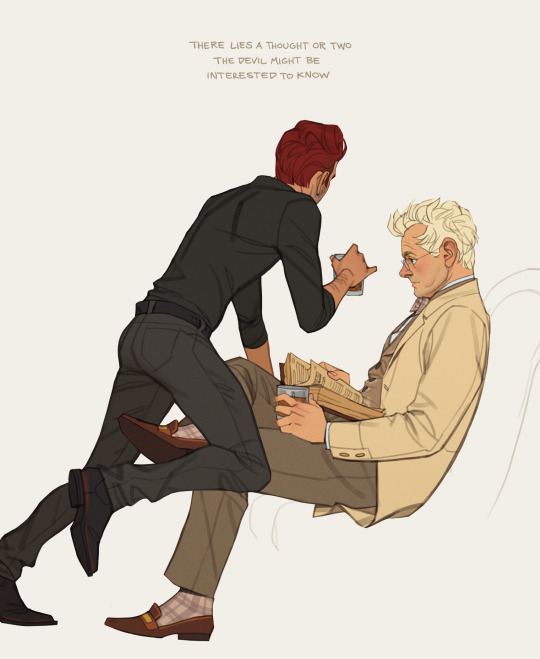
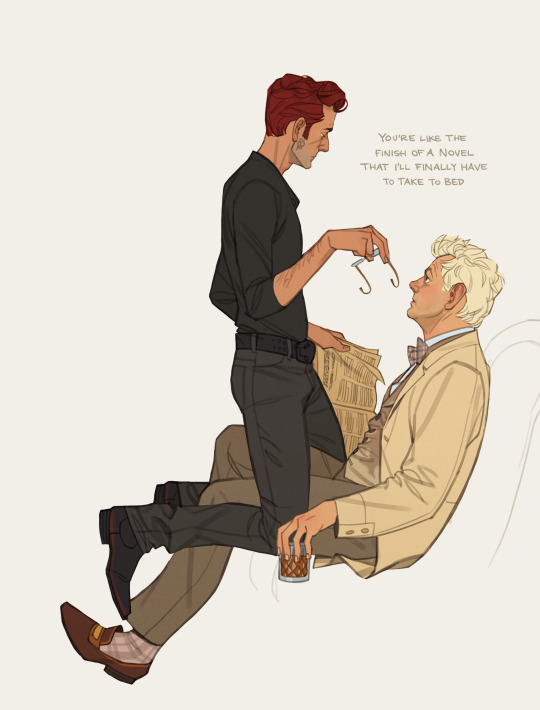
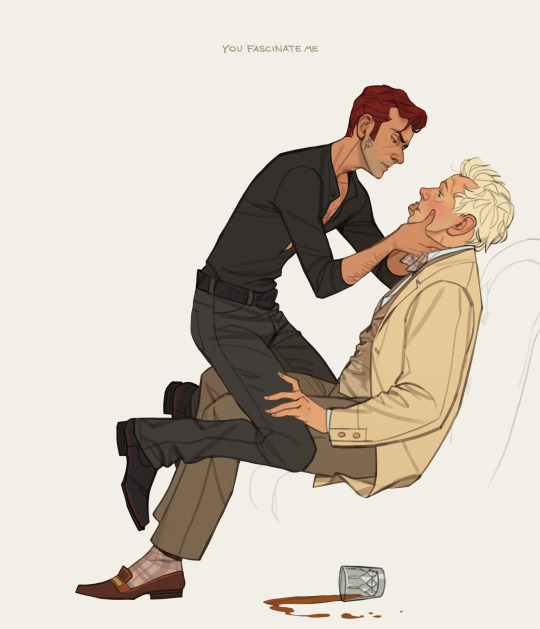

I have a feeling that beneath the little halo on your noble head
There lies a thought or two the devil might be interested to know
You're like the finish of a novel that I'll finally have to take to bed
You fascinate me so
You Fascinate Me So, Blossom Dearie
75K notes
·
View notes
Text
now im imagining what pride events in ankh morpork are like
14K notes
·
View notes
Text
A little scavenger hunt for the Good Omens fandom in London
I am visiting London and I did a thing. Because this fandom is the best thing in this world and I love you all.
If you go to the Bandstand (yes, that one) in Battersea Park (see the printscreen), look for 3 benches.
There is a piece of GO-themed artwork hidden behind each one of them.
The artwork is the same on all the benches, so please take just one :)
Have fun! Don't forget to share if you find the art! And if you can, please reblog this post. My reach on tumblr is super small but I would like this to get to the people. Thank you ❤️



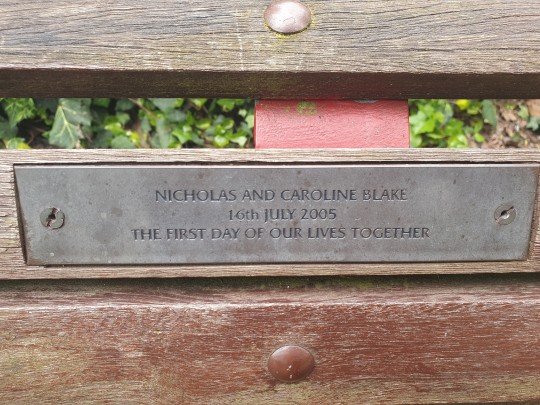
258 notes
·
View notes
Text
Moral purity and imaginative resistance as influencing factors in fandom 'anti' attitudes
Jessica Black et al.'s 2019 experiment on the correlation between enjoying dark/villainous characters, personal morality and purity beliefs, and imaginative resistance is so interesting when applying it to anti culture and fandom.
They created a Dark Character Scale where participants self-selected how strongly in agreement or disagreement they were with a series of statements about dark or villainous fictional characters. Some of these questions were the following:
"I enjoy films and books that feature main characters that choose morally questionable actions."
"I can often understand where the bad guys in fiction are coming from."
"My favourite fictional characters are morally ambiguous and often do horrible things."
They then utilised the Moral Foundations Questionnaire (Graham et al. 2011) to see what participants considered important when deciding on whether something is morally right or wrong, for example:
Whether or not someone suffers emotionally
Whether or not someone did something disgusting*
Whether or not someone was cruel
Whether or not someone was denied [their] rights
Whether or not someone acted in a way God would approve of*
as well as how strongly participants agreed or disagreed with statements such as:
Compassion for those who are suffering is the most crucial virtue
People should not do things that are disgusting, even if no one is harmed*
It can never be right to kill a human being
I would call some acts wrong on the grounds that they are unnatural*
Respect for authority is something all children need to learn.
One of the final scales participants used was the Black & Barnes (2017) Imaginative Resistance Scale. This is basically used to gauge how resistant the reader is to enjoying or consuming fictional content that contains characters, situations, or worldbuilding that they personally find morally disagreeable. They had to select how strongly they agreed/disagreed with questions like:
Reading books where bad things are depicted as morally acceptable makes me feel dirty
I just can't go along with a story when it violates my beliefs about morality
At times it feels like the author of a book is asking me to endorse actions that I know are wrong
Some things just shouldn't be done, even within a book
I sometimes cannot go along with a story when the "good" characters do morally reprehensible things
Sympathising with immoral characters makes me feel immoral myself.
Unsurprisingly, analysis of the data revealed that there was a strong correlation between disliking or not enjoying dark fictional characters or villains and having a higher purity morality score and more imaginative resistance.
They performed this test in three studies done on three completely different demographics - the first being mostly liberal women from social media sites, the second being mostly younger conservative college undergrads, and the third being adults split 50/50 in gender recruited from MTurk. All three studies showed that having stronger imaginative resistance and higher purity morality scores is directly linked to a lower score on the DCS - meaning that they would like or enjoy dark fictional characters and their actions less.
This tracks pretty well with what can be seen in the emerging anti culture within fandom:
Self-identified 'antis' are likely to agree strongly with the statements from the Imaginative Resistance Scale, and are more likely to score highly on the questions in Moral Foundations Questionnaire that are specifically demarcated as being concerned with purity (marked above with an asterisk *). This means that they are also, according to these studies, much more likely to disagree with dark fictional characters and their actions.
There is also a very interesting point in one of the discussions areas where Black et al. state "It is worth reiterating that the participants in Study 2 tended to be more conservative, and therefore potentially more likely to have greater concerns about moral purity" which tracks with what people in fandom have been saying about antis parroting conservative/puritan talking points and arguments.
What I find the most interesting is the following statement:
"However, moral purity and imaginative resistance are consistently positively correlated, both in the current studies and in prior research ... and are both likely to reflect a fear of moral contagion that would discourage people from identifying with and liking [dark fictional characters]."
This, when applied to antis, suggests that antis may harbor the subconscious belief that enjoying dark fictional content, and therefore being a 'proshipper', is literally psychically contagious. They may view this as some kind of moral disease which is spreading and infecting fandom, which could explain why they are so vehemently against it - fear. This is the puritan Moral Panic all over again.
Black et al. also discuss theories of fictional engagement and parasocial relationships/identification, and whether these studies is relevant to "when and for whom fictional engagement could have the potential to negatively affect real world attitudes or behaviour".
Jessica Black and Jennifer Barnes often publish articles together and have some incredibly interesting reading of morality and fiction that I'd be interested to see applied to fandom and anti culture in an academic setting. Perhaps some people in the field like Samantha Aburime (@rainystudios) are already looking into it - and I'm hoping I can do the same in my studies.
268 notes
·
View notes
